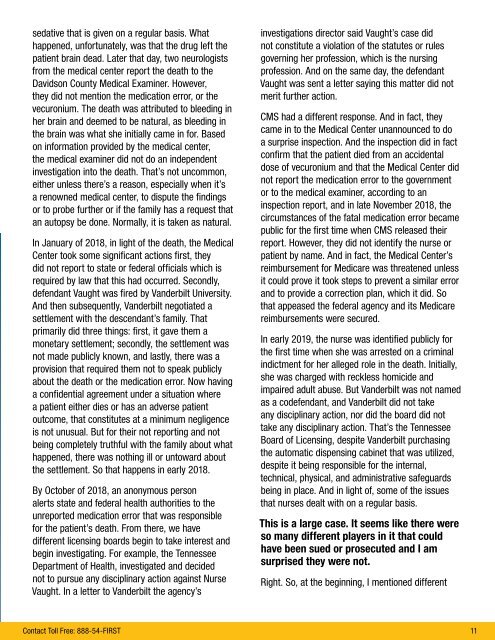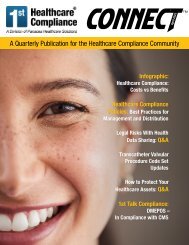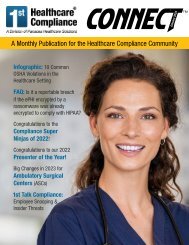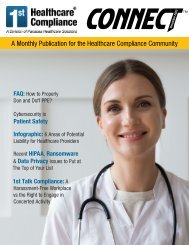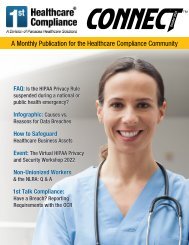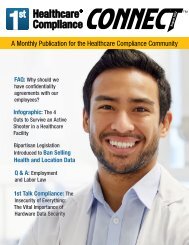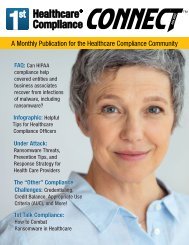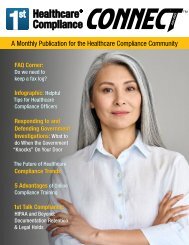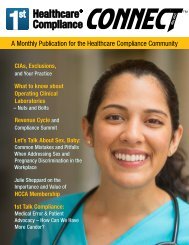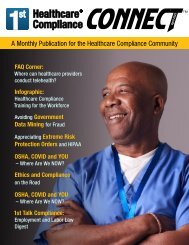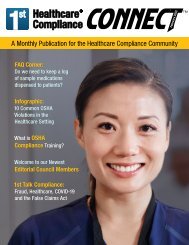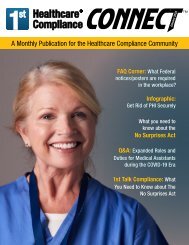First Healthcare Compliance CONNECT November 2022
Create successful ePaper yourself
Turn your PDF publications into a flip-book with our unique Google optimized e-Paper software.
sedative that is given on a regular basis. What<br />
happened, unfortunately, was that the drug left the<br />
patient brain dead. Later that day, two neurologists<br />
from the medical center report the death to the<br />
Davidson County Medical Examiner. However,<br />
they did not mention the medication error, or the<br />
vecuronium. The death was attributed to bleeding in<br />
her brain and deemed to be natural, as bleeding in<br />
the brain was what she initially came in for. Based<br />
on information provided by the medical center,<br />
the medical examiner did not do an independent<br />
investigation into the death. That’s not uncommon,<br />
either unless there’s a reason, especially when it’s<br />
a renowned medical center, to dispute the findings<br />
or to probe further or if the family has a request that<br />
an autopsy be done. Normally, it is taken as natural.<br />
In January of 2018, in light of the death, the Medical<br />
Center took some significant actions first, they<br />
did not report to state or federal officials which is<br />
required by law that this had occurred. Secondly,<br />
defendant Vaught was fired by Vanderbilt University.<br />
And then subsequently, Vanderbilt negotiated a<br />
settlement with the descendant’s family. That<br />
primarily did three things: first, it gave them a<br />
monetary settlement; secondly, the settlement was<br />
not made publicly known, and lastly, there was a<br />
provision that required them not to speak publicly<br />
about the death or the medication error. Now having<br />
a confidential agreement under a situation where<br />
a patient either dies or has an adverse patient<br />
outcome, that constitutes at a minimum negligence<br />
is not unusual. But for their not reporting and not<br />
being completely truthful with the family about what<br />
happened, there was nothing ill or untoward about<br />
the settlement. So that happens in early 2018.<br />
By October of 2018, an anonymous person<br />
alerts state and federal health authorities to the<br />
unreported medication error that was responsible<br />
for the patient’s death. From there, we have<br />
different licensing boards begin to take interest and<br />
begin investigating. For example, the Tennessee<br />
Department of Health, investigated and decided<br />
not to pursue any disciplinary action against Nurse<br />
Vaught. In a letter to Vanderbilt the agency’s<br />
investigations director said Vaught’s case did<br />
not constitute a violation of the statutes or rules<br />
governing her profession, which is the nursing<br />
profession. And on the same day, the defendant<br />
Vaught was sent a letter saying this matter did not<br />
merit further action.<br />
CMS had a different response. And in fact, they<br />
came in to the Medical Center unannounced to do<br />
a surprise inspection. And the inspection did in fact<br />
confirm that the patient died from an accidental<br />
dose of vecuronium and that the Medical Center did<br />
not report the medication error to the government<br />
or to the medical examiner, according to an<br />
inspection report, and in late <strong>November</strong> 2018, the<br />
circumstances of the fatal medication error became<br />
public for the first time when CMS released their<br />
report. However, they did not identify the nurse or<br />
patient by name. And in fact, the Medical Center’s<br />
reimbursement for Medicare was threatened unless<br />
it could prove it took steps to prevent a similar error<br />
and to provide a correction plan, which it did. So<br />
that appeased the federal agency and its Medicare<br />
reimbursements were secured.<br />
In early 2019, the nurse was identified publicly for<br />
the first time when she was arrested on a criminal<br />
indictment for her alleged role in the death. Initially,<br />
she was charged with reckless homicide and<br />
impaired adult abuse. But Vanderbilt was not named<br />
as a codefendant, and Vanderbilt did not take<br />
any disciplinary action, nor did the board did not<br />
take any disciplinary action. That’s the Tennessee<br />
Board of Licensing, despite Vanderbilt purchasing<br />
the automatic dispensing cabinet that was utilized,<br />
despite it being responsible for the internal,<br />
technical, physical, and administrative safeguards<br />
being in place. And in light of, some of the issues<br />
that nurses dealt with on a regular basis.<br />
This is a large case. It seems like there were<br />
so many different players in it that could<br />
have been sued or prosecuted and I am<br />
surprised they were not.<br />
Right. So, at the beginning, I mentioned different<br />
Contact Toll Free: 888-54-FIRST 11


